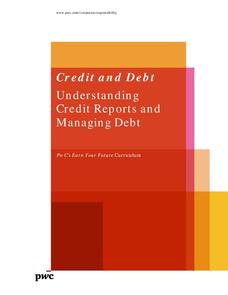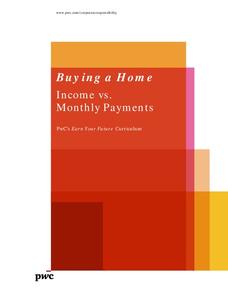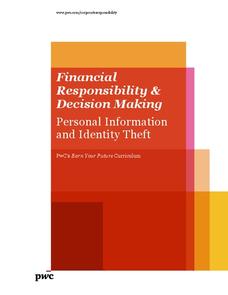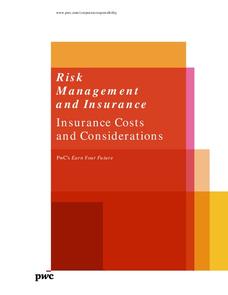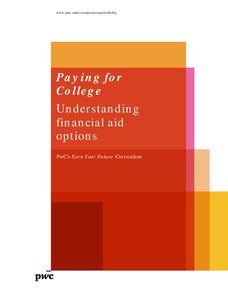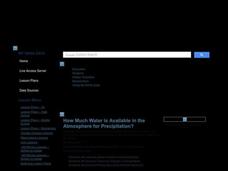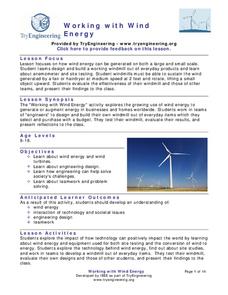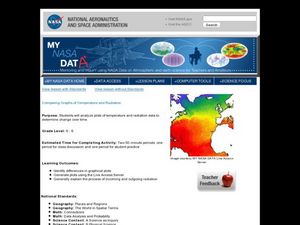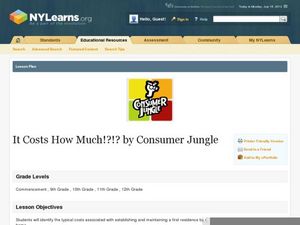PricewaterhouseCoopers
Saving and Investing: Building Wealth for Financially-Secure Futures
While spending is fun, saving for a retirement is the future. Young adults learn about the importance of saving and different opportunities to do so during their adulthood.
PricewaterhouseCoopers
Credit and Debt: Understanding Credit Reports and Managing Debt
Credit cards are tempting to use right out of high school. Teach your upperclassmen the benefits and challenges of credit and how it can affect their future. The lesson covers credit scores and ways to strengthen credit if...
PricewaterhouseCoopers
Buying a Home: Income vs. Monthly Payments
Purchasing a house takes more plan than elementary schoolers realize. Each buyer will look at monthly income to determine what they can afford for a mortgage and other expenses.
PwC Financial Literacy
Finanacial Responsibility and Decision Making: Personal Information and Identity Theft
Elementary schoolers look into the very real, and scary, practice of identity theft. They discover the main techniques used by people who steal other people's identity. Learners produce an identity theft tip sheet and share their tips...
PricewaterhouseCoopers
Credit and Debt: Decisions, Decisions...
Borrowing money seems like a great idea until you are in over your head. High schoolers learn the benefits and risks associated with credit and how to be a responsible borrower. More than just credit cards, they...
PricewaterhouseCoopers
Risk Management and Insurance: Insurance Costs and Considerations
Compare the different types of insurance with high schoolers, and have them learn the benefits and costs of medical, auto, and home policies. The resource addresses what makes some insurances more costly and what teenagers can do to...
PricewaterhouseCoopers
Buying a Home: Mortgage Decisions
High schoolers don't think they need to know about mortgages, but with college and renting soon approaching, fiscal responsibility is necessary. Pupils learn the vocabulary of a mortgage and calculate different home values to determine...
PricewaterhouseCoopers
Paying for College: Understanding Financial Aid Options
With many options to pay for college, middle schoolers learn about each possibility and that continuing their education is worth the investment. They discover the difference between a grant and a loan and that some expensive...
iCivics
Government Spending
After discussing personal financing with your class, consider following up with this well-rounded introduction to government spending. The resource includes reading documents and worksheets, and covers topics as the federal deficit and...
Curated OER
How Much Water is Available in the Atmosphere for Precipitation?
Students explore the relationship between the amount of water in the atmosphere available for precipitation and the actual precipitation observed by satellite. They examine seasonal changes in precipitation. They practice using Internet...
Teach Engineering
Bridging the Gaps
The London Bridge should not have fallen down. And here's why. After a brief history of bridges and the three main types, class members are introduce to the concepts of tension and compression, the two main forces acting upon bridges.
National Nanotechnology Infrastructure Network
Introduction to Nanotechnology Using the Creative Problem-Solving Model
Should we continue to spend money on nanotechnology? Groups engage in a problem-solving unique process around the newly emerging research field of nanotechnology. In order to propose a solution, the groups must research nanotechnology...
California Academy of Science
Food for Thought: Defining a Problem to Find a Solution
Scholars approach a problem trying to plan a meal for a class party. They learn about the restrictions and must decide what information they need to plan the meal. The first lesson in a 13-part unit on Our Hungry Planet encourages...
Curated OER
Fabric Art
Do kids use problem solving skills when they create scrap art? You bet they do! After examining the art of Mary Katherine Lamb, they create their own pieces using recycled products and vintage art techniques. They watch a video about the...
Curated OER
Does Humidity Affect Cloud Formation?
Young scholars use S'COOL data to identify factors that affect cloud formation. They find a data set using the S'COOL database , and use Excel to manipulate the data. Student isolate relevant data, create meaningful graphs from a...
Institute of Electrical and Electronics Engineers
Working with Wind Energy
After reading about how wind turbines work to collect clean energy, groups brainstorm and design their own windmill. Within the provided financial and physical constraints, groups must build a working windmill using only the materials...
Curated OER
Family Life in the 1830s
Young scholars compare and contrast family life today with family life in the 1830s. They conduct research on Old Sturbridge Village, read primary source documents, and develop a list of generalizations comparing/contrasting families of...
Curated OER
Comparing Graphs of Temperature and Radiation
Students study plots and use a Live Access Server to generate plots. In this temperature instructional activity students examine the process of incoming and outgoing radiation.
Curated OER
Solar Cell Energy Availability From Around the Country
Learners determine areas that are the most likely to produce solar energy by using NASA data. In this solar energy instructional activity students analyze plots and determine solar panel use.
Curated OER
Radiation Comparison Before and After 9-11
Using the NASA website, class members try to determine if changes could be detected in cloud cover, temperature, and/or radiation measurements due to the lack of contrails that resulted from the halt in air traffic after the attacks...
PLS 3rd Learning
It Costs How Much!?!?
Many teens conjure up images of how great their first apartment will be, but they lack a solid understanding of what it will cost to make it look that way. To gain an appreciation for the cost of furnishings, they create a collage of a...
Curated OER
Insurance Quotes
You're in high school and you just got the coolest car ever! But, now you need to start thinking about car insurance. Luckily, your teacher prepared you by engaging you in a life skills lesson like this one. The class actually calls...
Curated OER
Debt: Who Does it Affect?
Debt is a topic that affects everybody: the community, the nation, and the entire globe. Kids take charge of debt by designing a project that informs those in their community about good financial choices, keeps personal debt low, and...
PwC Financial Literacy
Charitable Giving
Charitable organizations and monetary donations to these organizations are the focus of the financial literacy lesson plan presented here. Learners explore how donations benefit both the organization and the people it serves. Each pupil...



